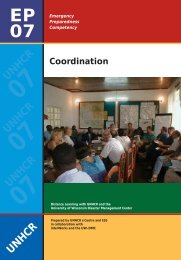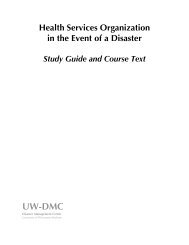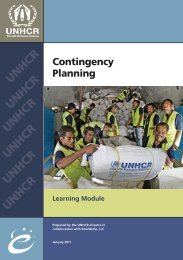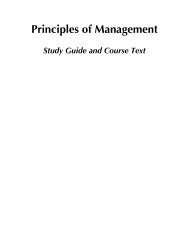Managing External Relations - Disaster Management Center ...
Managing External Relations - Disaster Management Center ...
Managing External Relations - Disaster Management Center ...
Create successful ePaper yourself
Turn your PDF publications into a flip-book with our unique Google optimized e-Paper software.
Chapter 1<br />
Assume that the people who are most visible are always the most credible or<br />
trustworthy. Attempt to find the people who are less visible and also trustworthy.<br />
Take more help than you give.<br />
Neglect to take time to thank someone who helps you (even in emergencies).<br />
Fail to respond to requests for help or information or fail to follow through<br />
on requests.<br />
Forget to do some research to find out what others have to give before you<br />
ask for their help.<br />
Fail to help someone who is in an unfortunate position. Your help will<br />
usually be remembered.<br />
Practical Steps for Improving your Network<br />
While much progress has been made in networking within UNHCR and with<br />
partner organisations, taking the following practical steps can help you improve<br />
your emergency preparedness network:<br />
1. Make records of your contacts. These should be more comprehensive than<br />
just business cards, and for emergency management purposes should include<br />
emergency-specific information. Include the person’s name, title, agency, phone/<br />
fax, E-mail, and other relevant information, such as where the person has lived or<br />
worked. For example, ‘worked in Goma refugee camp for three years,’ ‘worked<br />
on water supply in Sarajevo,’ ‘instrumental in forming inter-agency task force,’ etc.<br />
You may also want to record some information about your contacts’ networks.<br />
Remember, however, that the idea is to compile a list of people you can count on,<br />
not to collect a vast number of contacts.<br />
2. Periodically review these records, add to them, and renew your contacts.<br />
If you use a business card file or create cards for a Rolodex, for example, it pays<br />
to photocopy these periodically and take them to the field or carry them in your<br />
briefcase, leaving the originals in a safe place. The humanitarian response field<br />
has a very high rate of attrition, people who worked in the last major emergency<br />
may have quit humanitarian work, or changed their affiliation. While you should<br />
remove old or unused contacts from your records periodically, sometimes even<br />
someone who leaves the system may be a useful contact in a related field.<br />
3. Learn something about people and their agencies. Before you meet new<br />
people or someone you have not seen for a while, learn something about their<br />
background or their agency’s needs and interests so that you have common<br />
ground and can make a firm connection.<br />
4. Create mailing lists from your list of contacts. Send UNHCR publications to<br />
the people on your list who may not have good background information on<br />
UNHCR activities.<br />
5. Encourage networking skills in your team or division. The networks of<br />
the people you work with will also pay off for you.<br />
6. Know the information or support you have to share with others and the<br />
information and support you need to get.<br />
EP<br />
04<br />
9








